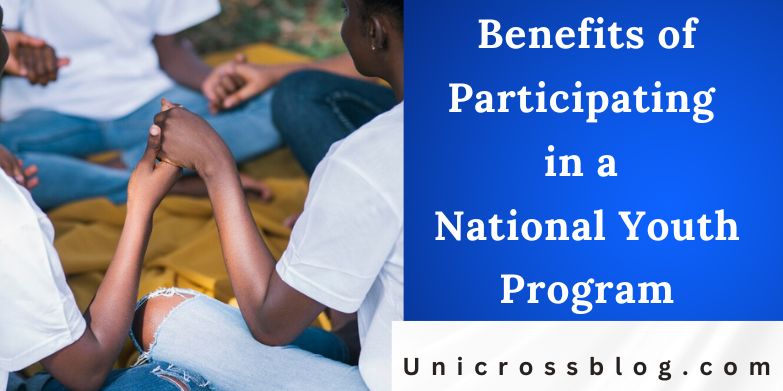National youth programs are structured initiatives designed to engage young people in activities that foster personal growth, community involvement, and skill development. These programs, often supported by governments, nonprofits, or educational institutions, provide opportunities for youth to explore their potential, connect with others, and contribute to society.
From leadership training to community service, national youth programs offer a platform for young individuals to develop essential life skills, build networks, and make a meaningful impact. Participating in such programs can be a transformative experience, equipping youth with the tools to navigate challenges and succeed in various aspects of life.

Benefits of Participating in a National Youth Program
1. Personal Growth and Self-Discovery
National youth programs encourage participants to step out of their comfort zones and explore their strengths and interests. Through workshops, team-building exercises, and reflective activities, young people gain a deeper understanding of themselves. These programs often challenge participants to set goals, overcome obstacles, and develop a sense of purpose. For example, activities like public speaking or problem-solving tasks help youth build confidence and resilience, qualities that are invaluable in both personal and professional settings.
2. Leadership and Teamwork Skills
Many national youth programs emphasize leadership development, teaching participants how to lead projects, motivate others, and make informed decisions. Group activities foster teamwork, requiring individuals to collaborate, communicate effectively, and resolve conflicts. These experiences prepare youth to take on leadership roles in their communities, schools, or future workplaces, while also learning the importance of cooperation and collective effort.
3. Skill Development
Youth programs offer opportunities to acquire practical skills that are applicable in various contexts. These may include communication, time management, project planning, or even technical skills like coding or environmental conservation techniques. By participating in hands-on activities, youth gain competencies that enhance their resumes and prepare them for future academic or career pursuits. These skills also boost employability, as employers value candidates with diverse abilities and real-world experience.
4. Networking and Community Building
National youth programs bring together individuals from diverse backgrounds, fostering connections that can last a lifetime. Participants meet peers, mentors, and professionals who share similar interests or goals. These networks provide support, inspiration, and opportunities for collaboration. Additionally, many programs encourage community engagement, allowing youth to contribute to local initiatives, build a sense of belonging, and develop a commitment to civic responsibility.
5. Exposure to New Opportunities
By participating in a national youth program, young people gain access to resources and opportunities they might not otherwise encounter. These may include scholarships, internships, mentorship programs, or exposure to new fields of study or careers. Programs often feature guest speakers, industry professionals, or site visits, giving participants a broader perspective on potential career paths and life choices.
6. Civic Engagement and Social Impact
Many national youth programs focus on community service or social issues, encouraging participants to address challenges like environmental sustainability, education inequality, or public health. By working on projects that benefit their communities, youth develop a sense of agency and learn how their actions can create positive change. This fosters a lifelong commitment to civic engagement and social responsibility.
7. Confidence and Resilience
Participating in challenging activities, such as outdoor adventures, public presentations, or competitive projects, helps youth build confidence and resilience. Overcoming obstacles and achieving goals in a supportive environment teaches them to handle setbacks and persist in the face of challenges. These experiences cultivate a growth mindset, encouraging youth to view failures as opportunities for learning.
8. Cultural Awareness and Inclusivity
National youth programs often attract participants from diverse cultural, socioeconomic, and geographic backgrounds. Engaging with peers from different walks of life promotes cultural awareness, empathy, and inclusivity. Youth learn to appreciate diverse perspectives, challenge stereotypes, and work effectively in multicultural settings an essential skill in today’s globalized world.
READ ALSO: How to Get Accepted Into Any Youth Program in Nigeria
FAQs
Who can participate in national youth programs?
Most national youth programs are open to young people within a specific age range, typically between 13 and 25, depending on the program. Eligibility may also depend on residency, academic status, or specific interests, but many programs prioritize inclusivity and welcome participants from diverse backgrounds.
Do national youth programs require prior experience?
No, most programs are designed to accommodate participants with varying levels of experience. They provide training and support to ensure everyone can participate fully, regardless of prior skills or knowledge.
How do national youth programs benefit academic or career goals?
These programs enhance resumes by demonstrating leadership, teamwork, and initiative. They also provide opportunities to explore career paths, gain certifications, or connect with professionals, which can lead to internships or job opportunities.
Are national youth programs time-consuming?
The time commitment varies by program. Some are short-term, lasting a few days or weeks, while others may span months or require regular participation. Many programs offer flexible schedules to accommodate school or work commitments.
What types of activities are included in national youth programs?
Activities vary widely but may include workshops, community service projects, leadership training, outdoor adventures, cultural exchanges, or skill-building sessions. Programs are often tailored to participants’ interests, such as technology, arts, or environmental advocacy.
Can participation in a national youth program lead to future opportunities?
Yes, many programs offer access to scholarships, mentorships, or professional networks. Participants often gain recognition for their contributions, which can open doors to further education, internships, or leadership roles.
How do these programs support personal growth?
Through reflective exercises, goal-setting, and challenging activities, participants develop self-awareness, confidence, and resilience. Programs often provide a safe space to explore personal strengths and address areas for improvement.
Are national youth programs inclusive for all participants?
Most programs strive to be inclusive, accommodating diverse backgrounds, abilities, and interests. They often include accessibility measures and promote an environment of mutual respect and understanding.







